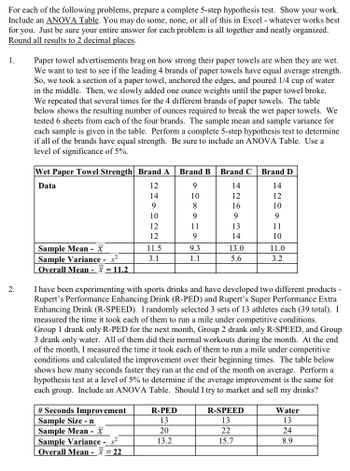
MATLAB: An Introduction with Applications
6th Edition
ISBN: 9781119256830
Author: Amos Gilat
Publisher: John Wiley & Sons Inc
expand_more
expand_more
format_list_bulleted
Question
Question 2 please

Transcribed Image Text:For each of the following problems, prepare a complete 5-step hypothesis test. Show your work.
Include an ANOVA Table. You may do some, none, or all of this in Excel - whatever works best
for you. Just be sure your entire answer for each problem is all together and neatly organized.
Round all results to 2 decimal places.
1.
2.
Paper towel advertisements brag on how strong their paper towels are when they are wet.
We want to test to see if the leading 4 brands of paper towels have equal average strength.
So, we took a section of a paper towel, anchored the edges, and poured 1/4 cup of water
in the middle. Then, we slowly added one ounce weights until the paper towel broke.
We repeated that several times for the 4 different brands of paper towels. The table
below shows the resulting number of ounces required to break the wet paper towels. We
tested 6 sheets from each of the four brands. The sample mean and sample variance for
each sample is given in the table. Perform a complete 5-step hypothesis test to determine
if all of the brands have equal strength. Be sure to include an ANOVA Table. Use a
level of significance of 5%.
Wet Paper Towel Strength
Data
Sample Mean - X
Sample Variance - ²
Overall Mean - x = 11.2
Brand A Brand B Brand C Brand D
12
9
14
10
9
8
10
9
12
11
12
9
# Seconds Improvement
Sample Size - n
Sample Mean - X
Sample Variance - s²
Overall Mean - x = 22
11.5
3.1
9.3
1.1
R-PED
13
20
13.2
14
12
16
9
13
14
13.0
5.6
14
12
10
I have been experimenting with sports drinks and have developed two different products -
Rupert's Performance Enhancing Drink (R-PED) and Rupert's Super Performance Extra
Enhancing Drink (R-SPEED). I randomly selected 3 sets of 13 athletes each (39 total). I
measured the time it took each of them to run a mile under competitive conditions.
Group 1 drank only R-PED for the next month, Group 2 drank only R-SPEED, and Group
3 drank only water. All of them did their normal workouts during the month. At the end
of the month, I measured the time it took each of them to run a mile under competitive
conditions and calculated the improvement over their beginning times. The table below
shows how many seconds faster they ran at the end of the month on average. Perform a
hypothesis test at a level of 5% to determine if the average improvement is the same for
each group. Include an ANOVA Table. Should I try to market and sell my drinks?
R-SPEED
13
22
15.7
9
11
10
11.0
3.2
Water
13
24
8.9
Expert Solution
This question has been solved!
Explore an expertly crafted, step-by-step solution for a thorough understanding of key concepts.
Step by stepSolved in 3 steps

Knowledge Booster
Similar questions
Recommended textbooks for you
 MATLAB: An Introduction with ApplicationsStatisticsISBN:9781119256830Author:Amos GilatPublisher:John Wiley & Sons Inc
MATLAB: An Introduction with ApplicationsStatisticsISBN:9781119256830Author:Amos GilatPublisher:John Wiley & Sons Inc Probability and Statistics for Engineering and th...StatisticsISBN:9781305251809Author:Jay L. DevorePublisher:Cengage Learning
Probability and Statistics for Engineering and th...StatisticsISBN:9781305251809Author:Jay L. DevorePublisher:Cengage Learning Statistics for The Behavioral Sciences (MindTap C...StatisticsISBN:9781305504912Author:Frederick J Gravetter, Larry B. WallnauPublisher:Cengage Learning
Statistics for The Behavioral Sciences (MindTap C...StatisticsISBN:9781305504912Author:Frederick J Gravetter, Larry B. WallnauPublisher:Cengage Learning Elementary Statistics: Picturing the World (7th E...StatisticsISBN:9780134683416Author:Ron Larson, Betsy FarberPublisher:PEARSON
Elementary Statistics: Picturing the World (7th E...StatisticsISBN:9780134683416Author:Ron Larson, Betsy FarberPublisher:PEARSON The Basic Practice of StatisticsStatisticsISBN:9781319042578Author:David S. Moore, William I. Notz, Michael A. FlignerPublisher:W. H. Freeman
The Basic Practice of StatisticsStatisticsISBN:9781319042578Author:David S. Moore, William I. Notz, Michael A. FlignerPublisher:W. H. Freeman Introduction to the Practice of StatisticsStatisticsISBN:9781319013387Author:David S. Moore, George P. McCabe, Bruce A. CraigPublisher:W. H. Freeman
Introduction to the Practice of StatisticsStatisticsISBN:9781319013387Author:David S. Moore, George P. McCabe, Bruce A. CraigPublisher:W. H. Freeman

MATLAB: An Introduction with Applications
Statistics
ISBN:9781119256830
Author:Amos Gilat
Publisher:John Wiley & Sons Inc

Probability and Statistics for Engineering and th...
Statistics
ISBN:9781305251809
Author:Jay L. Devore
Publisher:Cengage Learning

Statistics for The Behavioral Sciences (MindTap C...
Statistics
ISBN:9781305504912
Author:Frederick J Gravetter, Larry B. Wallnau
Publisher:Cengage Learning

Elementary Statistics: Picturing the World (7th E...
Statistics
ISBN:9780134683416
Author:Ron Larson, Betsy Farber
Publisher:PEARSON

The Basic Practice of Statistics
Statistics
ISBN:9781319042578
Author:David S. Moore, William I. Notz, Michael A. Fligner
Publisher:W. H. Freeman

Introduction to the Practice of Statistics
Statistics
ISBN:9781319013387
Author:David S. Moore, George P. McCabe, Bruce A. Craig
Publisher:W. H. Freeman